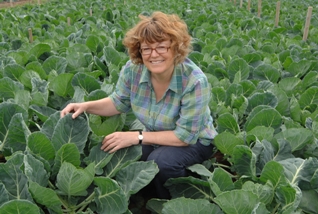News
Expert comment on new research into insect numbers
 Professor Rosemary Collier from Warwick Life Sciences and the Warwick Crop Centre comments on new research into insect numbers:
Professor Rosemary Collier from Warwick Life Sciences and the Warwick Crop Centre comments on new research into insect numbers:
"The new paper, ‘Meta-analysis reveals declines in terrestrial but increases in freshwater insect abundances published in Science, by van Klink et al. confirms, what to me is very obvious, that through terrestrial land-use change, we have altered and reduced the size of habitats that are suitable for a good number of species of insect …"
Rising to the Covid-19 Crisis at Shillingford Organics - an interview by Becca McGowan, Warwick Crop Centre
 Martyn Bragg has been farming organically on the outskirts of Exeter for the last 20 years. Horticultural produce from his farm is sold through his business, Shillingford Organics either directly to consumers or through wholesale to local enterprises.
Martyn Bragg has been farming organically on the outskirts of Exeter for the last 20 years. Horticultural produce from his farm is sold through his business, Shillingford Organics either directly to consumers or through wholesale to local enterprises.
The major outlet for the farm’s produce is its award-winning vegetable box scheme and online shop. Over the last month, the vegetable box scheme has experienced an unprecedented increase in customers; the number of boxes sold each week has doubled.
Like most food producers and processors, the business is experiencing a surge in demand due to the recent Covid-19 pandemic, however there is some uncertainty over how long they can maintain supplies and what future demand will look like when the crisis is over.
PhD student, Becca McGowan from the School of Life Science's, Warwick Crop Centre speaks to Martyn to discuss how the business is rising to the challenge!
The joy of seeds - Dr Charlotte Allender from Warwick Crop Centre explains
 Spring is a time when some amazing natural processes are on show. One of the most striking is the emergence of seedlings as the sun warms the soil and green shoots rise from the earth.
Spring is a time when some amazing natural processes are on show. One of the most striking is the emergence of seedlings as the sun warms the soil and green shoots rise from the earth.
With this appearance of life comes a feeling of joy and hope, and the promise of something very important: Food.
It is amazing that whole allotments and greenhouses full of vegetables and flowers can come from just a couple of handfuls of small, dry fragments. Dr Charlotte Allender, from Warwick’s Crop Centre, explains the importance, diversity and quite incredible resilience of seeds.
Applications invited for Postoctoral Research Associate positions in the history of food, agriculture and crop science, University of Cambridge
Postdoctoral Research Associate Positions in the History of Science, University of Cambridge
Applications are invited for two Research Associate positions, each with a fixed-term of 36 months, working on a Wellcome Trust-funded project on the recent histories of food, agriculture, and crop science to start on 1 September 2020 (or as soon as possible thereafter). We seek outstanding candidates with expertise in the history of 20th and 21st century science, agriculture, and environment to conduct independent research on the histories of plant introduction or the utilisation of crop collections.
The successful candidates will be based in the Department of History and Philosophy of Science (HPS) at the University of Cambridge. They will be part of the Wellcome Trust funded project 'From Collection to Cultivation: Historical Perspectives on Crop Diversity and Food Security' directed by Dr Helen Anne Curry. This project explores the history of international agricultural research related to crop diversity from the 1930s onward. It aims to develop a better understanding of how and by whom modern agricultural crops have been made.
Each successful candidate will conduct research on one of the following topics:
• The history of plant introduction (20th/21st centuries). Potential subjects include plant introduction stations, inspection procedures, plant health and quarantine regulations, and international phytosanitary standards, among others.
• The history of utilisation of crop collections (20th/21st centuries). Potential subjects include genebank database management, accession management and evaluation procedures, genomic sequencing of landraces and crop wild relatives, and bio-fortification programmes, among others.
Applicants are advised to consider the aims and methods of the larger project prior to submitting the application materials described in the job advertisement, and are encouraged to contact Dr Curry (hac44@cam.ac.uk) with any questions.
Eligible candidates must have a PhD in history of science, agricultural history, environmental history, historical geography, or science and technology studies. Knowledge of the history of 20th and 21st agriculture and/or life sciences is essential. Eligible candidates will also have experience in independent archival fieldwork and, more generally, in historical research methods. The successful candidates will be based in Cambridge and expected to attend regular project meetings.
The closing date for applications is 15 April 2020. For more details on the position and making an application, please consult the listing on the University of Cambridge job opportunities website: http://www.jobs.cam.ac.uk/job/25141/
Autonomous guided vehicles to transform horticultural labour shortage
An Autonomous Guided Vehicle is being designed by researchers at WMG, University of Warwick in a bid to help the horticultural sector tackle a labour shortage.
Food prices after a hard Brexit could increase by £50 per week
A hard Brexit could result in a family of four seeing their food prices increase to up to £50.98 per week researchers at the University of Warwick have found. If we leave with a deal the increase could be as little as £5.80 per week, or £18.17.
